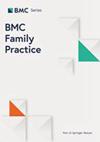在家庭医疗小组模式下为初级保健中的糖尿病足溃疡管理开发跨专业决策支持工具:加拿大德尔菲研究
IF 3.2
3区 医学
Q1 MEDICINE, GENERAL & INTERNAL
引用次数: 0
摘要
初级保健专业人员在协调初级保健提供者和二线专科医生之间的持续护理以及遵守糖尿病足溃疡管理实践指南方面遇到了困难。家庭医疗小组正在提供初级保健服务,旨在改善就医途径、跨学科保健、保健服务的协调和质量,并减少急诊室就诊次数。在家庭医疗小组工作的大多数专业人员都是初级保健医生和注册护士。本研究旨在开发并验证一种跨专业决策支持工具,以指导在家庭医疗小组模式下工作的初级保健专业人员管理糖尿病足溃疡。2019年12月至2021年8月期间,研究小组采用三轮德尔菲协议对其开发的一页决策工具进行了专家小组验证。该工具包括 43 项个人行动和从初次就诊到二级预防的护理路径。通过纸质和电子问卷收集数据,并将答案汇总到电子表格中。采用描述性统计对数据进行分析,每个项目的共识度定义为≥80%。糖尿病足溃疡跨学科护理团队中预先确定的 12 个专业的专家被纳入其中,59 人中有 39 人受邀参加第一轮(66.1%),39 人中有 34 人参加第二轮(87.2%),34 人中有 22 人参加第三轮(64.7%)。所有纳入决策支持工具最终版本的项目都达成了共识,并被认为是清晰、相关和可行的。每项行动都有一名或多名专业人员负责。这项研究提供了一个全面的决策支持工具,用于指导初级保健专业人员管理糖尿病足溃疡。今后还需要在临床环境中进行实施和评估。本文章由计算机程序翻译,如有差异,请以英文原文为准。
Developing an interprofessional decision support tool for diabetic foot ulcers management in primary care within the family medicine group model: a Delphi study in Canada
Primary care professionals encounter difficulties coordinating the continuum of care between primary care providers and second-line specialists and adhere to practice guidelines pertaining to diabetic foot ulcers management. Family medicine groups are providing primary care services aimed to improve access, interdisciplinary care, coordination and quality of health services, and reduce emergency department visits. Most professionals working in family medicine groups are primary care physicians and registered nurses. The aim of this study was to develop and validate an interprofessional decision support tool to guide the management of diabetic foot ulcers for primary care professionals working within the family medicine group model. A one-page decision tool developed by the research team was validated by an expert panel using a three-round Delphi protocol held between December 2019 and August 2021. The tool includes 43 individual actions and a care pathway from initial presentation to secondary prevention. Data collection was realized with both paper and electronic questionnaires, and answers were compiled in an electronic spreadsheet. Data was analyzed with use of descriptive statistics, and consensus for each item was defined as ≥ 80% agreement. Experts from 12 pre-identified professions of the diabetic foot ulcer interdisciplinary care team were included, 39 participants out of the 59 invited to first round (66.1%), 34 out of 39 for second (87.2%) and 22 out of 34 for third (64.7%) rounds. All items included in the final version of the decision support tool reached consensus and were deemed clear, relevant and feasible. One or more professionals were identified to be responsible for every action to be taken. This study provided a comprehensive decision support tool to guide primary care professionals in the management of diabetic foot ulcers. Implementation and evaluation in the clinical setting will need to be undertaken in the future.
求助全文
通过发布文献求助,成功后即可免费获取论文全文。
去求助
来源期刊

BMC Family Practice
医学-医学:内科
CiteScore
3.20
自引率
0.00%
发文量
0
审稿时长
4-8 weeks
期刊介绍:
BMC Family Practice is an open access, peer-reviewed journal that considers articles on all aspects of primary health care research. The journal has a special focus on clinical decision making and management, continuing professional education, service utilization, needs and demand, and the organization and delivery of primary care and care in the community.
 求助内容:
求助内容: 应助结果提醒方式:
应助结果提醒方式:


